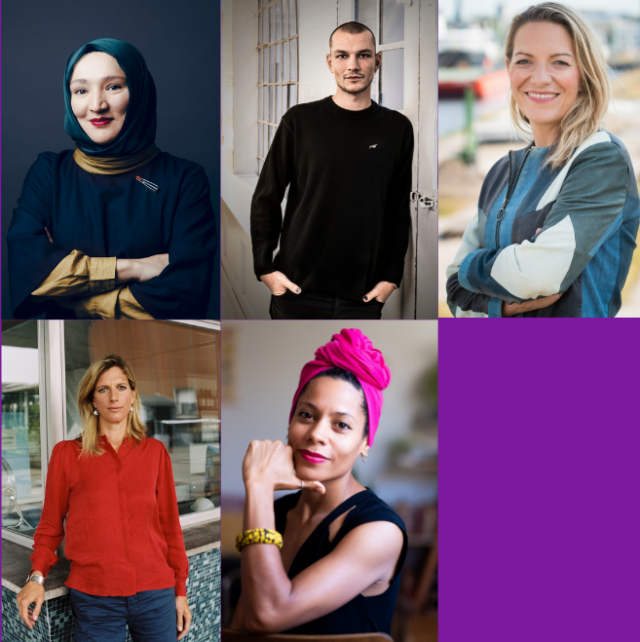
Prof. Dr. Antje Boetius
Director, Alfred Wegener Institute, Helmholtz Centre for Polar and Marine Research (AWI)
Head of Advisory Board, SILBERSALZ Science & Media Festival
Prof. Antje Boetius is Director of the Alfred Wegener Institute, Helmholtz Centre of Marine and Polar Research (AWI); Germany’s national polar research center. She is a deep-sea and polar researcher and an expert of marine biogeochemistry, biological oceanography, deep-sea biology and marine microbial ecology. Her research focuses on the Changing Arctic ecosystem and on extreme habitats of the oceans.
She has participated in almost 50 expeditions on international research vessels and is currently focusing on issues of climate change impacts on the biogeochemistry and biodiversity of the Arctic Ocean.
Antje Boetius has been awarded with the Medaille de la Societe d’Oceanographie de France, the Gottfried-Wilhelm-Leibniz Prize of the German Science Foundation, the Advanced Grant of the European Research Council, among many other honors. She is a member of the German National Academy Leopoldina (Section Geology), and of two European academies, as well as an elected Fellow of the American Geophysical Union and of the American Academy of Microbiology. She supports the strategic development of Wissenschaft im Dialog (WiD), an initiative of the major German scientific associations, where she has been head of the steering committee since 2014. As a nonprofit organization, WiD promotes discussion and exchange about research in Germany.
Fritz Habekuß
Author und science editor, Die Zeit
Fritz Habekuß, born in 1990 in Pritzwalk (Brandenburg), works as an editor for DIE ZEIT in Hamburg.
He studied science journalism at the TU Dortmund University with a focus on life sciences and medicine. During his studies he wrote for "Spiegel Online", the "Süddeutsche Zeitung", the "Tagesspiegel" and the "ZEIT". After graduation he interned at SPIEGEL in Washington, D.C.
As a reporter, he focuses mainly on ecology, nature and the anthropocene and on the fundamental relationship between man and nature: how humans define their role in the Anthropocene and how they deal with the existential threat of ecological crisis. But also which mechanisms are behind the destruction of nature and how things are connected in the global ecosystem earth.
His research has taken him to the Antarctic, to ancient oases in Oman, to villages in Rwanda, atolls in Indonesia, to remote glaciers in Greenland and the beaches of Galapagos Island.
In 2020, he published his first book, the bestseller ÜBER LEBEN – Zukunftsfrage Artensterben: Wie wir die Ökokrise überwinden (with Dirk Steffens) at Penguin.
Prof. Dr. Maja Göpel
Director of Research, The New Institute
Maja Göpel is a political economist and important voice for a sustainable transformation of society working at the intersection of economy, politics and society. She presents her ideas in scientific publications ("The Great Mindshift") as well as public books “Unsere Welt neu denken”, which has been on the German bestseller list for months. From 2017 to 2020, she was Secretary-General of the German Advisory Council on Global Change (WBGU), a body that advises the government on the design of global transformations towards sustainability. Previously, she headed the Berlin office of the Wuppertal Institute for Climate, Environment and Energy and represented the interests of future generations in EU and UN processes as Director Future Justice at the World Future Council. In 2019, Maja Göpel was appointed honorary professor at the Leuphana University of Lüneburg. She is a member of the Club of Rome, the World Future Council, the Balaton Group, the Bioeconomy Council of the German Federal Government and a co-initiator of the Scientists for Future network. On top of that, she supports several organisations by being a member of their scientific advisory councils, board of trustees or foundation councils.
Kübra Gümüşay
Journalist, author and activist
Kübra Gümüşay, born 1988 in Hamburg, studied political science in Hamburg and at the London School of Oriental and African Studies. She is the author of the bestseller "Sprache & Sein” (Language & Being), published by Hanser Berlin in spring 2020. She is co-founder of eeden, a feminist co-creation space in Hamburg, as well as numerous campaigns and associations - including the anti-racist #SchauHin campaign, the feminist alliance #ausnahmslos, which was awarded the Clara Zetkin Women's Award in 2016, and the campaign "Organised Love". She is a Fellow of the Progressive Centre and Associate Expert at the Center for Intersectional Justice. Her blog “Ein Fremdwörterbuch” was nominated for the Grimme Online Award in 2011. In 2018, Forbes magazine ranked her among the “top 30 under 30” in Europe in media and marketing.
Dr. Emilia Roig
Author, Founder and Executive Director, Center for Intersectional Justice (CIJ)
Dr. Emilia Roig (she/her) is the founder and executive director of the Center for Intersectional Justice (CIJ) and author of the book "WHY WE MATTER. The End of Oppression." She is a lecturer in the Social Justice Study Abroad Program at DePaul University of Chicago and teaches on Intersectionality Theory, Postcolonial Studies, Critical Racism Theory, and international and European Law.
From 2007 to 2010, she worked extensively on human rights issues at the International Labor Organization (ILO) in Tanzania and Uganda, at the German Agency for International Cooperation (GIZ) in Cambodia, and at Amnesty International in Germany.
She holds a PhD in political science, a Master of Public Policy and an MBA in International Law. She is a Jury member of the 2020 German Non-Fiction Prize and was on the jury of the 25th Edition F Women's Award in 2019, and was named a 2020 Ashoka Fellow.